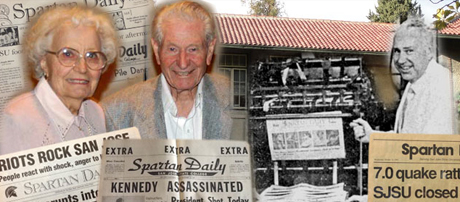One of the most generous gifts in San Jose State University’s history will push its journalism and communications department closer to the forefront of the digital age.
Bob Rucker, head of SJSU’s School of Journalism and Mass Communications, announced Wednesday that a couple who owned the press where the Spartan Daily student newspaper was printed for 20 years left $8.7 million in their will to help the school advance its digital marketing, new media and social media storytelling.
The Jack and Emma Anderson Fund is the sixth most generous endowment the university has ever received, school officials say. Jack Anderson, head of the press at Globe Printing Company, and his wife Emma, the company’s bookkeeper, gave student journalists a hands-on classroom for decades at their South First Street office, where they could finish page layouts before putting the newspaper to bed each night.
Eventually, the school brought newspaper production in-house. When the Daily Spartan turned to offset printing, Jack ceremoniously buried the old press in a concrete slab. He died in 1989 and Emma passed in March last year. In their will, the couple said it wanted to continue supporting journalism and marketing students by giving them the tools to keep pace with a changing industry.
“It’s a gift, and the beauty of it is that we get to decide what to do with it,” says Rucker, who has yet to finalize plans on how to allocate the money. “This is one of the most exciting gifts that any school could ever not see coming. With all the budget crisis issues and all the noise and nonsense coming out of Sacramento, it’s so incredible to have people who know us, and have worked with us for so long, support us in this immense way.”
The school will invest the money as an endowment, expecting to make anywhere from $150,000 to $300,000 or more a year in investment returns, Rucker says.
The program—which graduates about 200 people a year with degrees in journalism, communications and public relations—was one of two California university departments named by College Media Matters as one of the top 50 in the nation.
Already, the school has taken huge strides to keep step with professional media. It teams up with NBC Bay Area, Silicon Valley PR firms, tech giants and even Metro and San Jose Inside to give students real-world experience.
Rucker, a former CNN correspondent and SJSU faculty member of 22 years, plans to use some of the endowment to upgrade the multimedia lab and pay for state-of-the-art digital cameras, as well as ancillary equipment to modernize the broadcast journalism lab. The new equipment will give students a chance to produce pro-quality stories that can be broadcast on digital cable. Right now, the system is all analog. Rucker also wants to give his marketing and PR students the tools to produce high-quality commercials they can air on network TV. Journalism students could also soon have the tools to build their own digital apps, something they currently need outside help to accomplish.
Rucker also wants to grow the department’s specialized certificate training, offer more online advanced degree teaching and forge new partnerships with Silicon Valley giants like Facebook, Google and the like. In addition to upgrading existing classrooms, Rucker envisions establishing a center for new media/social media research for journalism students and faculty to study about gathering, analyzing and disseminating timely information. The center could also help marketing majors learn how to help companies target and maintain new customers.
Aside from technological changes, Rucker has changed the focus of his program, consolidating broadcast, photojournalism, newspapers and magazine into one degree focus: Multimedia. Merging those specializations better prepares students for the varied role of the modern journalist, he says.
Still, the fundamentals remain.
“Technology is an asset, but it’s not the end-all,” Rucker says. “Far too many people gravitate to the toys, the apps, the tablets, the shiny new technology, but not toward the ethical responsibility. That’s still the bottom line.”
He’d like companies like Facebook to test out new ideas with his students, so they could offer a perspective on the ethics of certain changes about privacy or other gray-area issues that come up when technology advances in a blur.
Ultimately, in looking for new partners, Rucker says he is keeping an eye out for people like the Andersons, who come to the classroom to take part in the learning experience, whether that means sharing information or equipment.
“For so many years, we stood out as one of the best journalism schools in the country, because of the faculty we hire and the overall quality of our program. But one thing we always lacked was the money to buy the latest technologies,” Ruck says. “This gift is going to be the greatest shot in the arm because we’ve never been in a position where we can count on good revenues. Now that piece of the puzzle is under control. We’ll never have to worry about that again, for the first time in this school’s 80-year history.”

